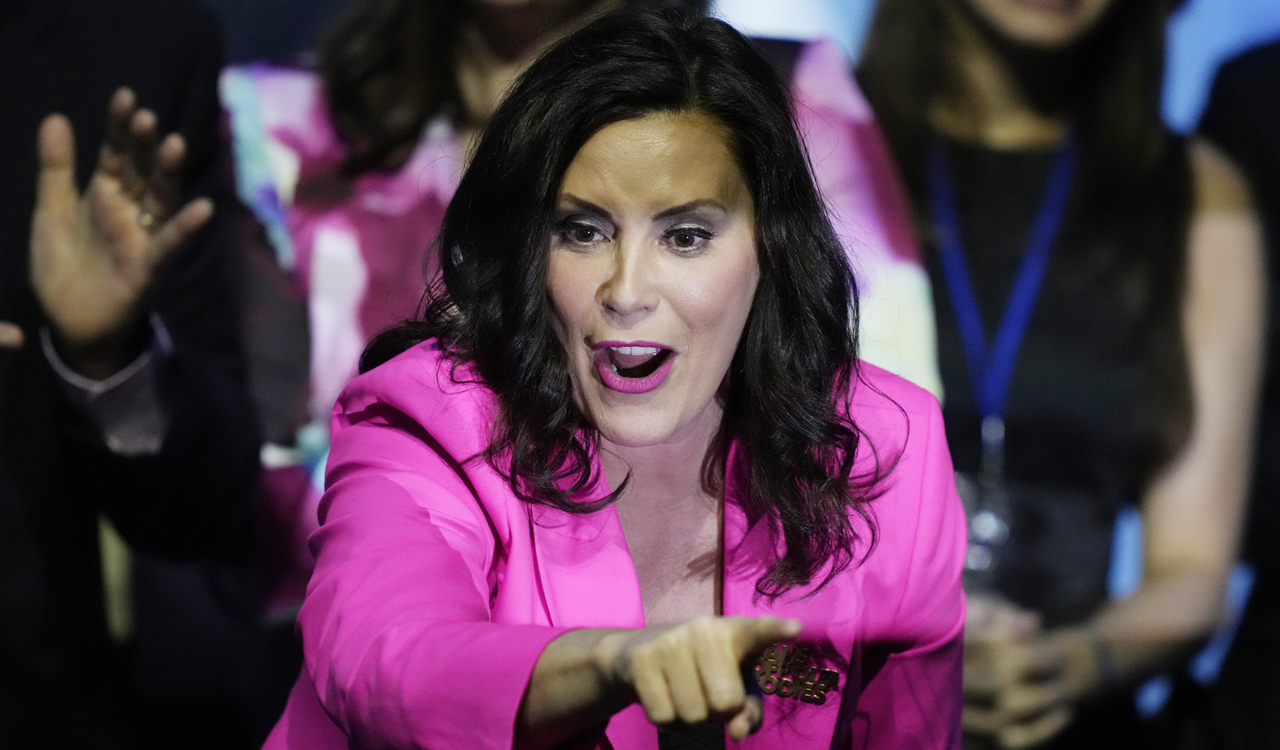‘She’s One Of Us’: Vanity Fair’s Lavishly Fawning Gretchen Whitmer Sales Pitch Is a Triumph of Cringe

AP Photo/Carlos Osorio
Whether they admit it or not, Democrats are definitely, absolutely, 100% jockeying for position in the race to potentially replace Joe Biden at the top of the 2024 ticket. And with Vanity Fair writer and former Clinton 2016 spokeswoman Jennifer Palmieri dropping an exhaustively fawning profile on Friday, Michigan Gov. Gretchen Whitmer may be taking the lead over California Gov. Gavin Newsom in the Darling of the Press category.
The headline of the article hits the reader over the head with that concept that otherwise is still given the pretense of subtext: “The Spartan: Why Gretchen Whitmer Has What It Takes for a White House Run”
Palmieri adds the obligatory nod and wink in the body of the piece, writing that, “no, Whitmer is not planning a primary challenge to Joe Biden this time around.” Like a candidate saying “I’m focused on X right now” when asked if they’ll be running, it’s boiler-plate ass-covering. But the declaration is clear that Whitmer is ready to step in the instant everyone agrees Biden simply can’t hack it in 2024.
Declaration may not be the right word, though. Sales pitch? Romance novel? Hagiography? Embarrassing??
It is, even among other such typically fulsome “Ode to a Democrat Hero” media pieces, an opulent and lavish outing.
“Whitmer looked me in the eye and delivered her economic message with such intensity that I almost felt sorry for Tudor Dixon, her Republican opponent,” for example. Did I hear faint echoes of Eminem’s “Stan” through my office window just now? Or perhaps it was Bette Midler singing about flying. And that’s about campaign trail economic commentary, not typically Shakespearian sonnet fare.
But the Vanity Fair piece, written with the energy of late-night QVC and a hint of multi-level marketing desperation, climbs higher still in trying to Make Gretch Happen.
In such profiles, which might better be called “profile builders,” it’s traditional to observe the adoration of the people. In keeping with the article’s taking of things to 11, it’s a prevalent notion.
Following Whitmer’s speech that day to educators in Detroit, I couldn’t get close as she was mobbed by people seeking selfies and hugs on her way out. In a ballroom full of Democrats, it’s not surprising the attendees love her. But their reasons stand out, as no one talks to me about the job she’s done. They talk about her. “She’s real.” “She’s just a Michigan mom.” “She doesn’t take any crap from anyone.” “She’s one of us.” To hear people gush about a woman’s relatability is a refreshing change. It is not a quality voters have traditionally associated with women politicians, but that is changing as a steady stream of women from all backgrounds run for office.
Mobbed. She’s real. They gush. She’s tough.
Toughness, too, is among the overarching virtues Vanity Fair extols. Whitmer tells “tough truths,” writes Palmieri. The governor’s “toughness can inspire that kind of admiration from people,” she says of a fan’s Whitmer tattoo.
Also this:
Having interviewed Whitmer for Showtime’s The Circus and based on my three decades in the political trenches, I could see she had the talent, drive, and toughness to be a solid national candidate.
Whitmer is a woman who is answering the call, we’re to understand, a regular person stepping up in extraordinary times. Overcoming personal hardships, learning from them what she’ll apply as a leader. It is the hero’s journey condensed from novel to near-novel length.
Each trial has compounded upon itself to make her stronger, more skilled, and turn her into the person before me—an enormous talent coming at a time when America has seen enough women in power that it is more likely to embrace her than be threatened by her.
That Homeric struggle contains another theme carefully crafted in the piece. It focuses in large part on the unique challenges and extra hardships of being a woman in politics, using phrases like “torrent of misogynistic energy,” but emphasizes the governor is no victim and the “dramatic progress women leaders have made” in the last several years.
“Women no longer have to model themselves after men to be recognized as leaders,” writes Palmieri as the profile approaches crescendo. “I see her now: She is a strong female executive who could be elected president.”
It is the realization of the headline in the conclusion, both said aloud and treated as unspoken.
The “Schrödinger’s Biden Replacement” game continues, with Democrats who both are and are not chomping at the bit to get him off them ticket and their own name on it, and in that game Whitmer’s Vanity Fair profile will stand out, not just for its excess but for the extra cringey effort to say 2024 without saying it.
But as journalism, the fan mail from a Clinton veteran to a Biden governor is not so much a stand-out as a cautionary tale on the seeming inability of the media to reign it in when pitching admiration as observation.
This is an opinion piece. The views expressed in this article are those of just the author.




